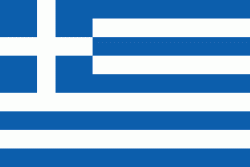Kanalia (Kanália)
Kanalia (Κανάλια) is a village in Thessaly, Greece, part of the municipality Rigas Feraios. It is located 26 km from Volos and at a height of 80 m above the sea level. It is one of the prettiest on the north-west side of Pelion. It is built on the foundation of the Acropolis Voivis in the plains of Metochi. On the hill above the village one can see the remains of the walls of ancient Voivis, the Homeric Boebe (Βοίβη), as well as the ruins of three forts that protected the road. Kanalia, Kapourna and Kerasia, Magnesia make up the first municipality of Voivis in Volos. The church of Saint Nicolas (11th century), can be found in the area. Visitors to the area enjoy the plethora of almond trees when they are in blossom, they can even attend the celebration of the Blossoming Almond trees.
There is a lake in the area named Lake Karla by the previous name of Kanalia village which was drained between 1960 and 2000. Since 2001 the Greek Government has attempted to reconstruct the lake to its previous size, through the financial aid of European Union and Natura 2000.
There is a lake in the area named Lake Karla by the previous name of Kanalia village which was drained between 1960 and 2000. Since 2001 the Greek Government has attempted to reconstruct the lake to its previous size, through the financial aid of European Union and Natura 2000.
Map - Kanalia (Kanália)
Map
Country - Greece
 |
 |
| Flag of Greece | |
Greece is considered the cradle of Western civilization, being the birthplace of democracy, Western philosophy, Western literature, historiography, political science, major scientific and mathematical principles, theatre and the Olympic Games. From the eighth century BC, the Greeks were organised into various independent city-states, known as poleis (singular polis), which spanned the Mediterranean and the Black Sea. Philip II of Macedon united most of present-day Greece in the fourth century BC, with his son Alexander the Great rapidly conquering much of the ancient world, from the eastern Mediterranean to the North Western parts of India. The subsequent Hellenistic period saw the height of Greek culture and influence in antiquity. Greece was annexed by Rome in the second century BC, becoming an integral part of the Roman Empire and its continuation, the Byzantine Empire, which was culturally and linguistically predominantly Greek.
Currency / Language
| ISO | Currency | Symbol | Significant figures |
|---|---|---|---|
| EUR | Euro | € | 2 |
| ISO | Language |
|---|---|
| EN | English language |
| FR | French language |
| EL | Greek language |















